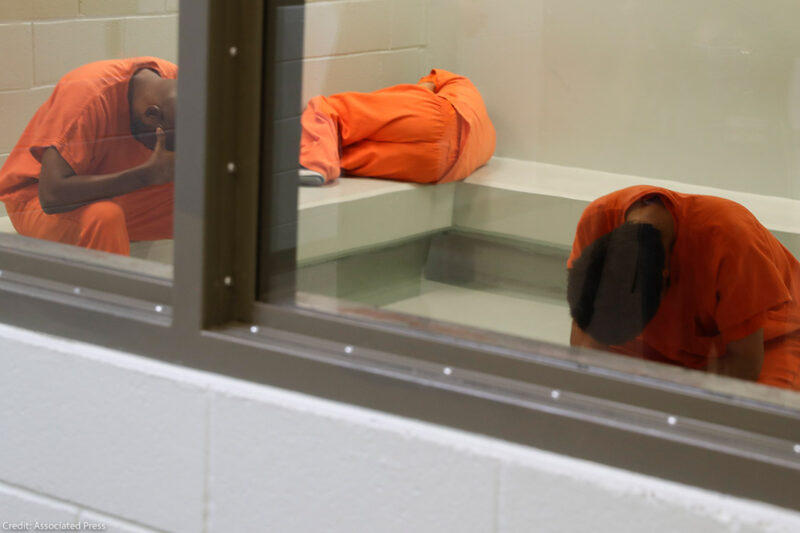The Trump Administration Weakens Standards for ICE Detention Facilities


Last month, Immigration and Customs Enforcement (ICE) officially released a new version of its (NDS), which govern the treatment of immigrant detainees held in almost 140 facilities in 44 states. These facilities include local and state jails and prisons ÔÇö some operated by private prison companies ÔÇö under contract with ICE. Despite being considered ÔÇ£civil detention,ÔÇØ almost 20 percent of ICE detainees are held in these jails and prisons, many of which are located in remote, rural locations.
ICE describes its revisions to the NDS as a set of ÔÇ£streamlined,ÔÇØ ÔÇ£updated, modernized standards.ÔÇØ In reality, the new NDS weakens critical protections and lowers oversight requirements, which could have disastrous consequences for the health and safety of thousands of people in immigration detention.
ICEÔÇÖs own Civil Rights and Civil Liberties Office that ICE has ÔÇ£systematically provided inadequate medical and mental health care and oversight to immigration detainees in facilities throughout the U.S.ÔÇØ Yet, ICEÔÇÖs new NDS has removed even basic, minimal safeguards necessary for adequate medical care. ICE no longer requires facilities governed by the NDS to maintain current accreditation with the National Commission on Correctional Health Care (NCCHC).
Also gone is the requirement that health assessments of detainees be performed according to national correctional standards. ItÔÇÖs important to remember that the journey to the U.S. is arduous ÔÇö many people arrive in poor health, and at least in ICE custody in 2018 and 2019. These health assessments, which already lack rigor, are a critical life-saving mechanism.
Although ICE has come under fire for inadequate medical and mental health staffing, the new NDS no longer requires health care and medical facilities at these jails to be under the direction of a licensed physician, but instead a ÔÇ£Health Services Administrator.ÔÇØ Congress has for greater oversight of deaths in immigration detention, but ICE has now weakened reporting and record-keeping requirements in the event of a detaineeÔÇÖs death at these facilities.
The new NDS further weakens protections for immigrant detainees against the use of force and solitary confinement by officers. The prior version of the NDS barred officers from the use of ÔÇ£hog-tying, fetal restraints, tight restraints, improperly appliedÔÇØ against immigrant detainees ÔÇö but this restriction is now eliminated. Facilities are no longer explicitly required to store use-of-force equipment securely. The new NDS broadens allowable reasons to place a detainee in solitary confinement and has removed specific protections for detainees in disciplinary proceedings facing solitary confinement. Medical staff at these facilities may now place detainees in medical segregation (solitary confinement) for refusing examination or treatment.
ICE has also eliminated standards that help to preserve detaineesÔÇÖ basic dignity. For example, ICE no longer requires that hold rooms have toilets with modesty panels, and removes the ratios for the number of toilets per detainee. ICE has removed language requiring that new contract facilities have outdoor recreation facilities, meaning that more detainees could be held for months or even years without time outdoors as they wait for their cases to be heard.
Under the new rules, immigrant detainees will face even greater hurdles in accessing lawyers and legal materials. The new NDS no longer requires facilities to guarantee non-governmental organizations access to detention facilities, and removes specific requirements for non-profits to provide legal education, monitoring, and visitation in these facilities. The new NDS eliminates a list of required immigration law materials that each facility must maintain in their law libraries, and limits indigent detainees to only five pieces of legal mail per week. Detainees may be subject to strip searches after an attorney visit.
The new NDS has improved some provisions for guaranteeing telephone access to detainees in order to find counsel, although they fall short of the requirements outlined in a settlement to Lyon v. ICE, a lawsuit brought by the └¤░─├┼┐¬¢▒¢ß╣¹ in 2016. The new NDS has also added new provisions for the prevention and intervention of sexual abuse and assault in detention, accommodations for disabled detainees, and language access for people with limited English proficiency. These provisions, however, were already required by the Prison Rape Elimination Act, Section 504 of the Rehabilitation Act, and Title VI of the Civil Rights Act.
Detention standards provide the clearest set of requirements for the treatment of immigrants in detention, and contractually bind the local jails, prisons, and private prison operators that detain immigrants for ICE. ICEÔÇÖs standards also serve as the metric for facility inspections and oversight by the Department of Homeland Security, which the DHSÔÇÖs Office of Inspector General has already found to be dangerously flawed. These weakened standards also disregard CongressÔÇÖs expectation that ICE implement the Performance Based National Detention Standards (PBNDS), a more rigorous set of standards, at all immigration detention facilities nationwide. By cutting these standards, ICE has set the stage for further danger and abuse of immigrant detainees.
The detention of immigrants is a cruel and harmful practice, which has only grown worse under the Trump administration. We cannot allow this administration to lock up more immigrants in a system that is already so broken. We must demand Congress call for a moratorium on detention, reduce the number of detention beds, cut funding for TrumpÔÇÖs massive deportation force, and reject all funding and proposals for any new plans to jail immigrants and families. Instead, Congress should shift funding and resources away from detention and toward community-based alternatives to detention and access to counsel.

